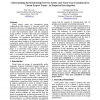Free Online Productivity Tools
i2Speak
i2Symbol
i2OCR
iTex2Img
iWeb2Print
iWeb2Shot
i2Type
iPdf2Split
iPdf2Merge
i2Bopomofo
i2Arabic
i2Style
i2Image
i2PDF
iLatex2Rtf
Sci2ools
HICSS
2008
IEEE
2008
IEEE
Understanding the Relationship between Justice and Team Goal Commitment in Virtual Project Teams: An Empirical Investigation
Virtual project teams are spontaneous group configurations that endeavor to overcome spatial and temporal restrictions in bringing together distant experts to create just-in-time knowledge sharing coalitions. Due to their time-constrained nature and the anonymity among members, we believe that team goal commitment might be a more pertinent factor driving task performance. We hypothesize that members’ perceived distributive, interactional, and procedural justice are viable antecedents leading to the inducement of team goal commitment among virtual project team members. A longitudinal field experiment was carried out to test these hypotheses. The results suggest that: (1) distributive justice is a consistently strong predictor of team goal commitment over time; (2) the effect of interactional justice on team goal commitment manifests over time, and; (3) procedural justice has no effect on team goal commitment over time. Implications for both theory and practice are discussed.
| Added | 29 May 2010 |
| Updated | 29 May 2010 |
| Type | Conference |
| Year | 2008 |
| Where | HICSS |
| Authors | Eric Tze Kuan Lim, Yu-Ting Caisy Hung |
Comments (0)

